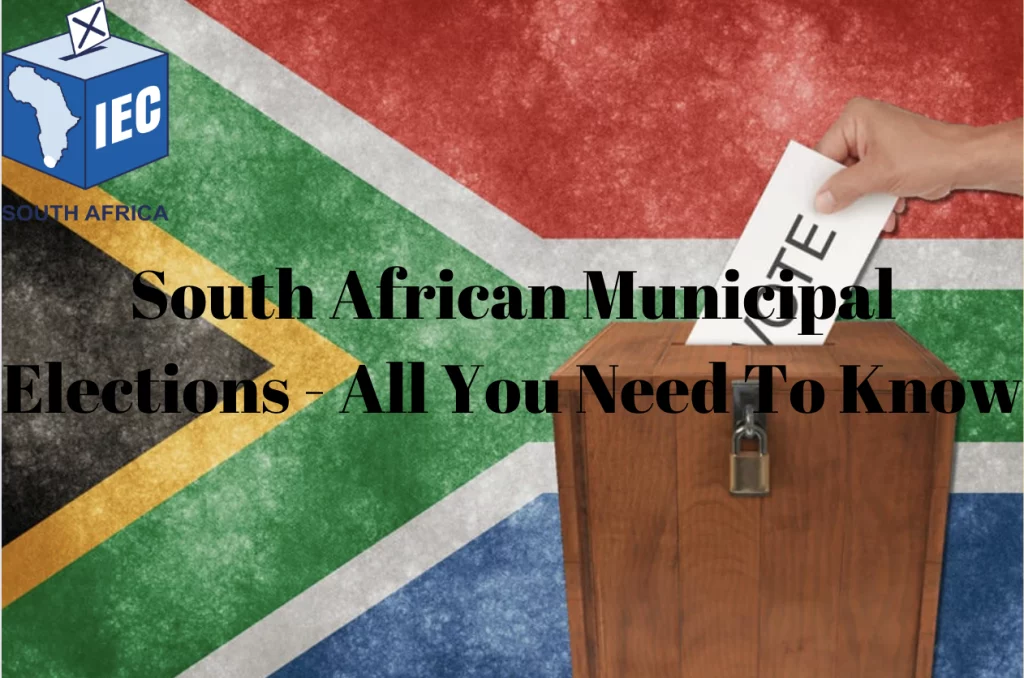South Africa Municipal Elections Results – The Municipal Elections are a vital juncture in the lively terrain of South African democracy, where the nation’s pulse is measured through its citizens’ collective voices. These local elections reflect the dynamic tapestry of South African communities, displaying the goals, concerns, and mandates that influence the future of municipalities across the country.
As the anticipation grows and ballots are cast, the South Africa Municipal Elections Results become a focal point, unraveling the tales written by citizens from metropolitan centers to rural landscapes. These findings shed light on the political situation and the changing demands and priorities of South Africa’s diverse people.
This introductory investigation lays the groundwork for a more in-depth understanding of the importance of municipal elections, diving into the subtleties of the electoral process, the diversity of candidates and parties, and the possible influence these outcomes may have on the trajectory of local governance. Join us on a trip through the Municipal Elections results, where a mosaic of voices finds expression in South Africa’s democratic fabric, determining the fate of communities and strengthening the concepts of inclusivity, representation, and civic involvement.
What Is The Role Of The Independent Electoral Commission In South Africa?
The Independent Electoral Commission (IEC) in South Africa oversees and manages elections at various levels, which is critical to the country’s democratic process. Here are some of the Independent Electoral Commission’s primary functions and responsibilities:
- The IEC’s principal mandate is to conduct free and fair elections at the national, provincial, and local levels. This includes supervising the registration of political parties, voters, and candidates.
- The IEC is in charge of keeping an accurate and up-to-date voter roll. This includes registering eligible voters, maintaining voter information, and ensuring that citizens have the chance to exercise their right to vote.
- The IEC facilitates the registration of political parties, ensuring that they meet the essential qualifications and follow election regulations. Registered parties can run candidates in elections.
- The IEC oversees the nomination process for candidates seeking political office. This includes confirming candidates’ eligibility and ensuring that all essential documentation is in order.
- The IEC is in charge of designing and creating the official ballot papers used in elections. This procedure is critical to preserving the voting process’s integrity and secrecy.
- On election day, the IEC coordinates the creation and operation of polling stations, the distribution of ballots, the collection of votes, and the counting of ballots. They ensure that the entire electoral process is legal and transparent.
How Long After Voting Are The Results Available in South Africa?
The time it takes for election results to be released in South Africa varies depending on several factors, including the type of election, the size of the voting process, the effectiveness of the electoral system, and the verification procedures in place.
During national elections, you can get live updates on the voting count because the SABC and ENCA normally broadcast the results frequently – or in some circumstances, 24 hours a day. Graph depicting the performance of each political party and the number of seats they will earn in the national government.
Doing it this way for municipal elections would be extremely challenging, given South Africa has 278 municipalities and 4468 wards as of 2022.
As a result, the IEC publishes official municipal election results on its website; these results may be available on election day but may take a few working days to verify.
Duration After Voting Before Results
The time between voting and the publication of election results can vary depending on several factors, such as the type of election, the size of the voting process, the effectiveness of the electoral system, and any unanticipated situations. Here are some general thoughts:
- The length of time it takes to count and declare results can vary depending on the type of election. Because of their smaller scale, local elections, such as municipal elections, may have a faster turnaround than national elections.
- The size and intricacy of the election both play an influence. Votes may take longer to tally and verify in larger countries or areas with more constituencies. Additionally, if many positions are being contested, such as presidential, parliamentary, and local seats, the procedure may become more complicated.
- The employment of technology in the voting and counting process can have an impact on the speed with which results are announced. Electronic voting technologies and effective data management can help to speed up the process.
- Electoral commissions frequently have mechanisms in place to examine and audit the results to ensure accuracy and fairness. This verification procedure may lengthen the overall time.
- Legal challenges, disagreements, or recounts made by candidates or parties may cause the revelation of results to be delayed.
- The logistics of transporting vote boxes, particularly in geographically broad or difficult places, can influence the time it takes to compile and announce results.
- The efficiency of the communication infrastructure, particularly the transfer of results from polling stations to central counting centers, might affect the speed with which results are disseminated.
It is critical to note that there is no set timeframe, and the duration might vary greatly from one election to the next. To ensure the integrity of the electoral process, election officials often strive for a balance of speed and precision. It is suggested that you follow updates from the official electoral commission or relevant authorities monitoring the election for the most accurate and timely information on election results.
How To Access South African MUNICIPAL Election Result Online
If you are looking to access elections results, you can go on the official website of IEC South Africa by clicking on this link https://results.elections.org.za/home/
Alternatively, you can;
- The South African Independent Electoral Commission (IEC) is the official authority in charge of organizing elections. Visit www.elections.org.za for more information.
- Look for a section on the website dedicated to election results. The IEC usually has a section or page where you may get real-time or updated election results.
- If numerous elections are going place at the same time (e.g., municipal, provincial, national), select Municipal Elections or the specific election you are interested in.
- To obtain comprehensive results, the IEC frequently provides an online results page where you can enter particular criteria such as the municipality or region.
- Reputable news websites also provide election coverage and real-time updates. Major news outlets’ websites may contain election coverage sections.
- Election results are frequently shared by the IEC and news organizations on their official social media platforms. For updates, visit Twitter or Facebook.
- The IEC may develop a mobile app that offers election-related information, such as results. Check your app store for an official IEC app.
- If you are having problems or have special questions, please contact the Independent Electoral Commission directly. They may offer assistance or point you in the right direction.
To ensure authenticity and dependability, always use official sources for election results. Election results are frequently updated in real-time or at regular intervals, so checking constantly during and after the voting process will provide the most up-to-date information.
How To Access Municipal Election Results Offline in South Africa
If you are looking to access the municipal results, kindly follow this link and follow the steps to the very latter. https://results.elections.org.za/home/downloads/me-results
Alternatively, you may;
- Local television and radio stations will provide in-depth coverage and updates on municipal election outcomes. Real-time reporting and analysis is frequently provided by news channels.
- In the days following an election, printed newspapers publish detailed election results. Look for special election editions or results sections. Newspapers are widely distributed through newsstands and other outlets.
- Pay a visit to your local government, municipal offices, or community centers. Physical copies of election results may be put on bulletin boards or accessible for public viewing at these sites.
- Look for community bulletin boards in public places, town halls, or local community centers. These boards frequently broadcast critical community information, such as election results.
- Local Independent Electoral Commission (IEC) offices may have printed materials or formal notices displaying election results. Visit their offices for up-to-date and confirmed information.
- Look for official publications from the Independent Electoral Commission, municipal administrations, or government agencies. These publications, which may be accessible in hard copy, provide a detailed breakdown of election results.
- The SABC and ENCA will also provide extensive coverage of the results from key cities such as Johannesburg, Cape Town, and Ekurhuleni. They may also include the outcomes of closely contested municipalities such as Nelson Mandela Bay, where coalition administrations were created after no outright majority was achieved in prior local elections.


